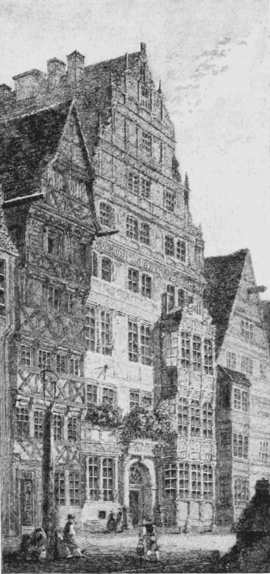of archivist, cashier, curator of the museum, overseer of matters pertaining to the publishing and sale of the calendar, and to act as a reporter for Leibniz. Many of the difficulties connected with the academy during its earlier years grew out of the fact that the two Jabloniskis were so intimately concerned with its management. Yet the secretary was a man of rare learning, and in many ways well adapted to his position. His brother was a member of the academy for forty-one years,  House of Leibniz at Hannover. was deeply interested in it, and for some years after the death of Leibniz was the means of keeping it alive.
House of Leibniz at Hannover. was deeply interested in it, and for some years after the death of Leibniz was the means of keeping it alive.
During the first decade of its existence the academy did very little. Some of its members were jealous of Leibniz, but he paid no attention to this fact, and did his work as if nothing had happened. The king wanted the academy to add to the glory of his reign, but would furnish no means other than those which came from the calendar monopoly for its support. Kirch and his wife, who was his efficient aid, made the calendar accurate and trustworthy and gave what time they could to astronomical study. Kirch's astronomical work was confined to the study of comets, sunspots and variable stars. But the income of the academy only just kept it alive.
The French language was used in the discussions and reports. Indeed, at this time the French population of Berlin contained within its ranks a larger number of distinguished men than the German. It is not surprising, therefore, that so many of the leading members of the academy were for so many years of French origin. The progressive element of the city was French. Their preachers and authors were the only men in Berlin who could meet the Benedictine church historians on their own ground. The German element was well represented by John Leonard Frisch, director of the Gray Cloister Gymnasium, who did more work for the academy during his connection with it than any
